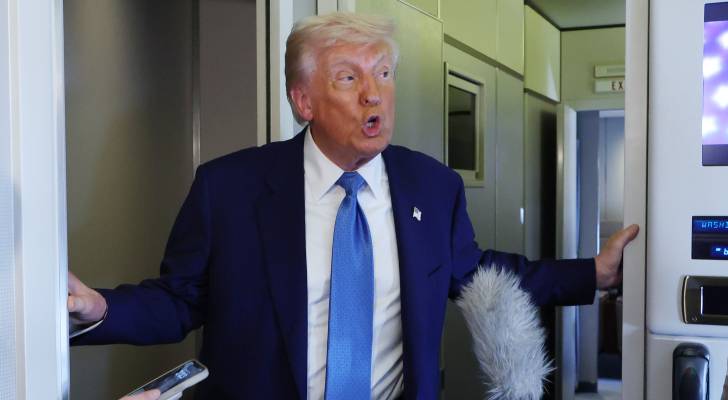
A new executive order signed by President Donald Trump calls for an immediate halt to federal funding of NPR and PBS, citing what he calls “biased and partisan news coverage.”
A statement from the White House called the outlets “biased” with “trash that is passed as news.” The order directs the Corporation for Public Broadcasting (CPB) to immediately cease funding of the National Public Radio (NPR) and Public Broadcasting System (PBS).
Don’t miss
- I’m 49 years old and have nothing saved for retirement — what should I do? Don’t panic. Here are 5 of the easiest ways you can catch up (and fast)
- Gain potential quarterly income through this $1B private real estate fund — even if you’re not a millionaire. Here’s how to get started with as little as $10
- You’re probably already overpaying for this 1 ‘must-have’ expense — and thanks to Trump’s tariffs, your monthly bill could soar even higher. Here’s how 2 minutes can protect your wallet right now
The statement accused both organizations of receiving “tens of millions of dollars in taxpayer funds each year to spread radical, woke propaganda disguised as ‘news.’”
Three CPB board members were removed from their role via email, with just two board members remaining.
Public broadcasting on the chopping block
The Trump administration listed 24 examples of “biased” coverage, including the production of a film supporting reparations, failure to cover the Hunter Biden laptop story and the suggestion that crime fears are rooted in racism.
Even beloved puppets weren’t spared.
“PBS show Sesame Street partnered with CNN for a town hall aimed at presenting children with a one-sided narrative to ‘address racism’ amid the Black Lives Matter riots,” the statement said.
Patricia Harrison, president and CEO of CPB, responded by saying the organization is not under the president’s authority
“Congress directly authorized and funded CPB to be a private nonprofit corporation wholly independent of the federal government,” she said, adding that when it was created, it specifically prohibited any government agency or official from directing or controlling its operations.
For the 2025 fiscal year, the CPB received $535 million in federal funding, with about 70% going to support local radio and TV stations.
NPR says it receives about 1% of its funding directly from the federal government. Its 246 member institutions receive 8% to 10% of their funds from CPB. PBS and its stations receive about 15% of their revenues from CPB.
“The appropriation for public broadcasting, including NPR and PBS, represents less than 0.0001% of the federal budget,” Katherine Maher, president and CEO of NPR, said in a statement.
Maher said that NPR programming is essential to its 246 member organizations, which operate more than 1,300 stations. These stations generate on average 50% of all public radio listening, despite only accounting for roughly 25% of station programming.
Read more: Want an extra $1,300,000 when you retire? Dave Ramsey says this 7-step plan ‘works every single time’ to kill debt, get rich in America — and that ‘anyone’ can do it
The impact on smaller communities
For many rural or remote communities, free public broadcasting is often the only source of news.
In southwestern Colorado, for example, many communities are considered “news deserts,” meaning they rely heavily on public broadcasting. According to 9News, the local affiliate KSUT in Ignacio would lose about 19% of its budget, or $333,000, while Colorado Public Radio would lose about 7% or $1.5 million.
Shari Lamki, president and general manager of Pioneer PBS in Granite Falls, Washington, told The Journal the funding — which makes up about 29% of the station’s annual budget — is “irreplaceable.”
In addition to local and national news, local stations provide public safety information and emergency alerts.
“I have no doubt that the loss of this critical funding would impact this region and the safety of our citizens,” Lamki said.
Aside from the inevitable job losses, the disappearance of strong local stations could diminish civic pride, education and cultural connection — all key to neighborhood stability and desirability. Rural and remote communities would be hit hardest.
Funding cuts “would devastate the public safety, educational and local service missions of public media,” Kate Riley, president and CEO of America’s Public Television Stations, said in a statement. She added that more than 160 local TV stations — particularly those in rural areas — serve as a “lifeline in hundreds of communities where there is no other source of local media.”
Cutting this content would also mean less access to free, educational programming like Sesame Street — especially for families who can’t afford paid alternatives. That includes more than 50% of American children who don’t attend preschool.
PBS LearningMedia — a free resource developed by PBS and local stations — serve about 1.5 million educators, students and homeschoolers each month.
“These are services that American families rely on every day,” Riley said. “In fact, according to a recent YouGov survey, 82% of voters — including 72% of Trump voters — said they valued PBS for its children’s programming and educational tools.”
According to a Pew Research Center survey, about 24% of U.S. adults say Congress should cut federal funding from NPR and PBS. But 43% say they should continue receiving government support.
What to read next
- Millions of Americans now sit on a stunning $35 trillion in home equity — here’s 1 new way to invest in responsible US homeowners while targeting a 14%-17% IRR
- Robert Kiyosaki warns of a ‘Greater Depression’ coming to the US — with millions of Americans going poor. But he says these 2 ‘easy-money’ assets will bring in ‘great wealth’. How to get in now
- Here are 5 ‘must have’ items that Americans (almost) always overpay for — and very quickly regret. How many are hurting you?
This article provides information only and should not be construed as advice. It is provided without warranty of any kind.